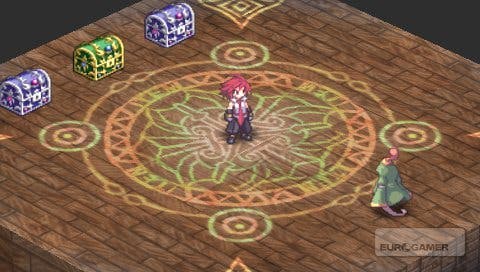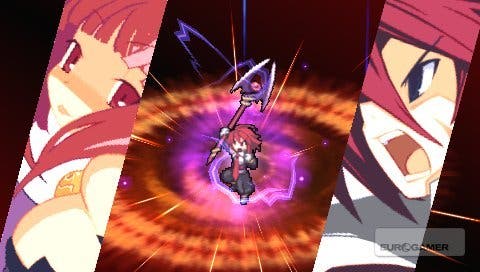Disgaea 2: Dark Hero Days
The sun's gone dim?
This is somewhat addressed by the PSP-exclusive chapters included here, which focus on Axel, a once-popular movie star with acute ADD, who is now host of a daytime television Travel programme. His standout four bonus chapters reveal just how much more comfortable the Disgaea team is with writing for a broken, flawed protagonist and both the humour and writing outstrips that found in the main body of the game.
Of course, the characters and story exist primarily to lead you into the game's deep and complex mechanics and, as ever, Disgaea approach to the strategy RPG is superlative. Battles play out on the type of gridded environments seen in Fire Emblem and Ogre Battle and charge you with defeating a team of opponents using your own handmade team of fighters. You take turns with the AI to move your team around the environments, casting spells, executing attacks and linking up into combos with adjacent friendly units.
Disgaea's grand innovation is to only deem a character's turn 'finished' when they attack. This makes it possible to move your characters back and forth around the map positioning them for team combo attacks (earning valuable experience points as they do so) before returning the to their starting position for their own 'turn'.
The result of this flexibility is that the means are always as important as the ends, and indeed often more so, and extracting every potential experience point from a map becomes both an obsession and something of an art form.

The strategy balloons as you create pupil/teacher relationships between your characters. When standing directly next to their teachers, pupil characters can share abilities, even if ones outside of their class. Use an ability enough and the pupil can learn it for himself, allowing you to, for example, teach a Ninja the 'Heal' spell and so on.
The flexibility of the system is dizzying, as its possible to tailor your squadron in microcosmic detail. Later in the game you can reincarnate characters back to level 1, improving their base stats and carrying over abilities from their previous incarnation. In this way your team fast becomes the sum of every decision you've ever made, their abilities and potential the direct result of your choices in battle.
The micromanagement extends to items and weaponry themselves, as, via the item world its possible to metaphorically 'enter' items - everything from swords to health-restoring chewing gum. Each item has a set number of stages within it, which must be worked through and beaten one by one. Each stage that you complete within the item levels it up by a factor of one.
Within items, new characters known as specialists can be found and recruited. Essentially stat modifiers, specialists can then be moved between items to upgrade your equipment; so a 'marksmen' found in a breastplate item, when recruited, can be moved into a gun to increase its accuracy, and so on.

The port is a solid one, although the short loading screen that fires every time you turn the PSP from a paused battle is an intrusion. The mechanics imported from Disgaea 3 are inserted tactfully and improve the game in subtle ways for experts, but for newcomers the prospect of yet more systems to become acquainted with will weary, not excite.
Nippon ichi's problem is that the first Disgaea was already a rich, often convoluted playpen for precision levelling and stat mastery. Each iteration since then has added new complexities that have, in reality, done little to improve the original's strong core.
That the amends have been accompanied by ever-weaker surrounding storylines means that, despite the on-paper improvements in this release, the first Disgaea remains Nippon Ichi's best. All the same, Disgaea 2 is a deep and flexible game and should it get its hooks in you will lose your mind to it. That fact alone begs the question: why reinvent?
